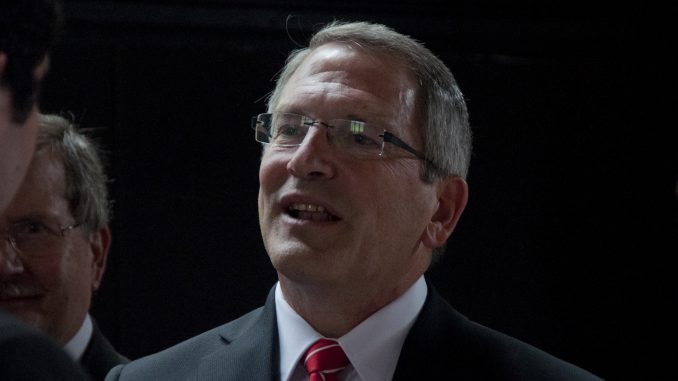
 After a nearly year-long search that looked at approximately 150 applicants, the Board of Trustees and the Presidential Search Committee settled on their choice earlier this month: Dr. Neil Theobald.
After a nearly year-long search that looked at approximately 150 applicants, the Board of Trustees and the Presidential Search Committee settled on their choice earlier this month: Dr. Neil Theobald.
Theobald, a 55-year-old administrator at Indiana University and first-generation college student, was formally approved as Temple’s 10th president by the board on Aug. 7, and will begin Jan. 1, 2013.
Temple’s new chief was the unanimous choice by the Presidential Search Committee, and even after interviewing about 25 people for the job, Theobald impressed enough to earn a five-year contract with a base pay of $450,000. It was his first attempt to become a university president.
Theobald’s credentials include being the senior vice president and chief financial officer at a major Big Ten university, but what sold many at Temple was his focus on first-generation college students – which he is one of – and an obsession with maintaining access to higher education.
BOLD CHOICE
Temple’s newly named president wasn’t even supposed to go to college himself. Theobald, who grew up in Peoria, Ill., was slated to move on to the assembly line after high school, said Board of Trustees Chairman Patrick J. O’Connor, but a scholarship from Trinity College in Hartford, Conn., changed all of that.
The first-generation college student received his Ph.D. from the University of Washington in Seattle in 1988, and was brought on by the school to become a faculty member until 1993, when he headed to Indiana. Theobald said that, about 10 years ago, he was brought into the provost’s office and has moved up the ranks since to his current senior vice president position.
During Theobald’s time managing the budget at Indiana, mean SAT scores for incoming students shot up and the campus’ financial aid endowment more than doubled from $150 million to $370 million. This record of making higher education affordable and improving the quality of the education, was something that put Theobald over the top.
“He certainly understood the nuts and bolts of colleges and universities, in terms of their accessibility and affordability,” said O’Connor, who chaired the Presidential Search Committee. “He spent his career ensuring that kids could get an affordable and excellent education.”
O’Connor added: “To bring his ideas to Temple is just a game-changer for students.”
Acting President Richard Englert also praised the new president for his academic prowess and fiscal responsibility.
“Without a doubt he is the right person at the right time,” Englert said. “He comes with a great, great background, in finance, in academics.”
Theobald has tried to find an even balance between lowering the costs of higher education and improving its quality, he said in an interview with The Temple News.
“It doesn’t do you any good to simply lower costs if you lower quality at the same time. We have to train students and prepare them for a very competitive economy when they graduate,” Theobald said. “You can provide access, you can provide opportunity, but if it’s not affordable to students, you really undercut yourself.”
EXPANSIVE SEARCH
After Ann Weaver Hart, former president, announced last September that she would not be returning, the Board of Trustees created the Presidential Search Committee to look for her replacement.
The 15-person committee consisted of one student, two faculty members and 12 trustees who, O’Connor said, considered about 150 people for the presidency, and interviewed between 20 and 25 people for the position.
Though the process encompassed the entire 2011-12 academic year, O’Connor said he wouldn’t change how the search was handled and it didn’t narrow down its search until only a few months ago.
“In June, we had three outstanding candidates,” O’Connor said. “One, a sitting president at a 35,000 student university, one a provost of a major Midwestern university and [Theobald]. All of them were better than the ones we looked at before. So, we had amazing choices in June and July.”
O’Connor credited Englert for taking the role of acting president because he said it enabled the committee to continue searching for the right candidate.
The board chairman also said that while there were some calling for the names of the candidates to be made public, it wouldn’t have been feasible.
“There was a cry that we should have been more public,” O’Connor said. “What you can’t do to these candidates is go public because if they’re not chosen, their own job at their own institution is at risk.”
EASING THE TRANSITION
Until Jan. 1, Theobald will remain at his administrative post at Indiana and Englert will stay on as acting president, but Theobald’s work at Temple has already begun. Theobald said that he’ll be on Main Campus for a few days starting Sept. 5, and will focus on getting to know the issues surrounding Temple.
“[The] biggest part of this is listening,” Theobald said. “There’s no way in the world that I know what’s best for Temple University.”
Englert said that he is working to make sure that Theobald is “ready to go” on Jan. 1, and said that Theobald has taken well to it and is a “quick learner.”
While Theobald will be balancing work at Indiana and being briefed on the issues at his next job before taking residence in Englert’s current office, O’Connor said that he has already educated himself about Temple and has studied what is going on around the university.
“He’s a listener. He’s not a guy who came in who is arrogant, who pontificated and told us what his ideas were,” O’Connor said. “He listened to what our needs were, he studied the issues at Temple.”
Sean Carlin and John Moritz can be reached at news@temple-news.com.


Be the first to comment